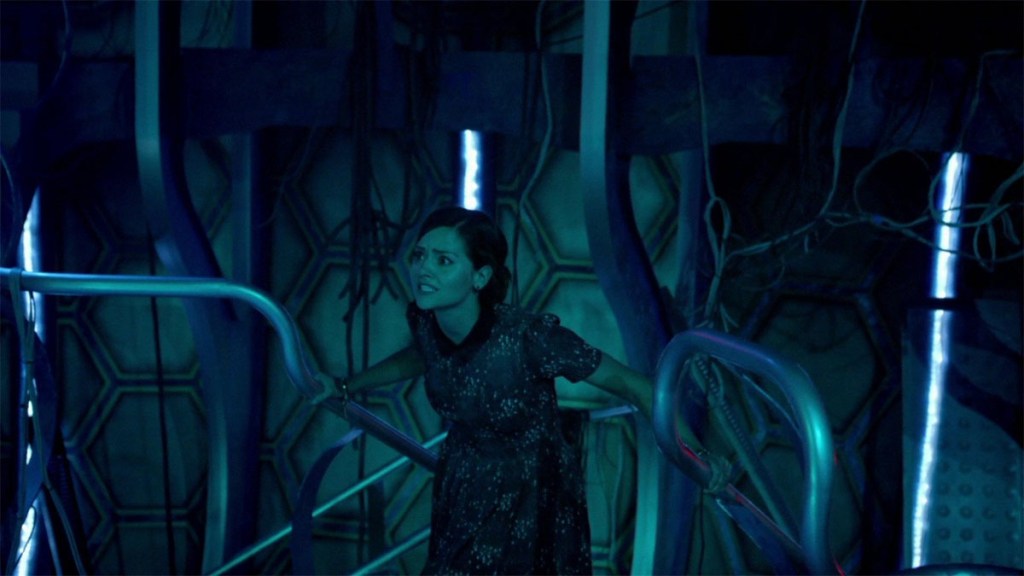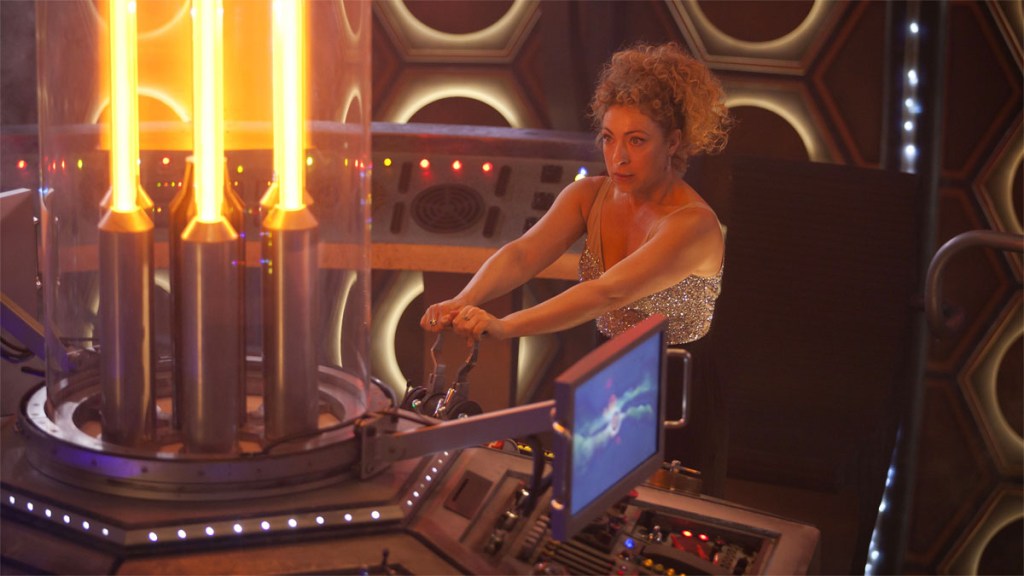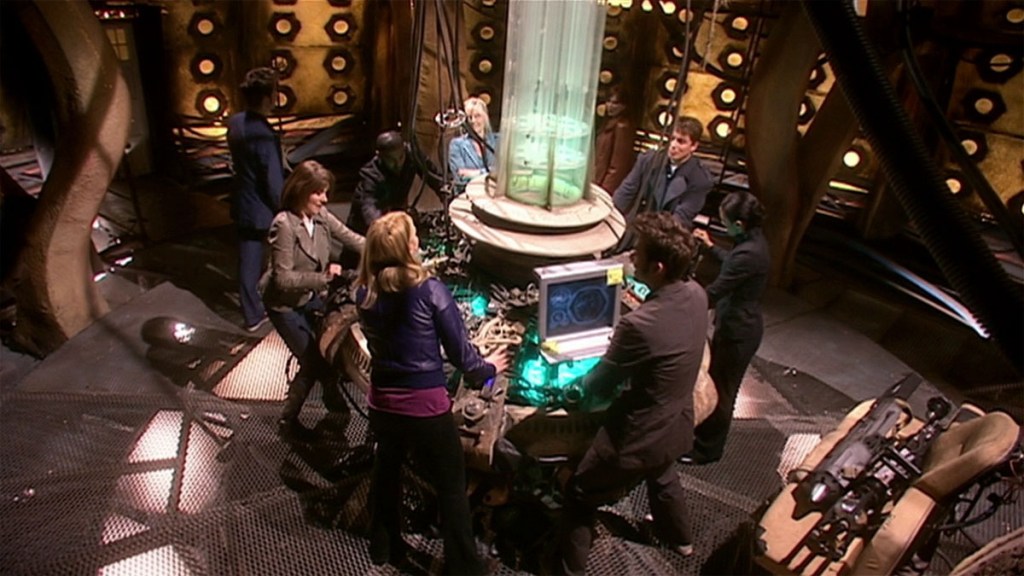Doctor Who: What Do We Actually Know About the TARDIS?
How big is it on the inside, how many people can it transport, how is it powered, and does it still have a swimming pool? There's a lot we still don't quite know about Doctor Who's TARDIS.

We all know the TARDIS. Blue box. Travels in space and time. Bigger on the inside. May contain a hat stand. For the Doctor and her friends it is home, it is a safe port of call from monsters and cracks in time and the combined hordes of Genghis Khan. But how well do we really know the TARDIS? In many ways it is the most mysterious part of Doctor Who lore. After all, every other mystery in the universe is one the Doctor quickly sets about trying to solve- even those about herself. The TARDIS, however, is just how she hops between mysteries. The Doctor has no time to worry about the inner workings of the TARDIS because she’s always leaving it to go somewhere else.
However, over the years we have gleaned some tidbits about the workings of this marvelous time ship, so let’s answer a few of the big questions.
What’s it called?
Let’s start with what it’s called. That’s “the TARDIS” which stands for “Time And Relative Dimension In Space”. Or sometimes “Time And Relative Dimensions In Space”. The name was coined by the Doctor’s granddaughter, Susan, although also we’ve seen people refer to TARDISes by the name before Susan could have come up with it. The Big Finish audio “The Beginning” tries to reconcile this by having Susan come up with a name herself that coincidentally is also the name Time Lords used for them anyway.
Only as Bill points out when she first learns about the TARDIS, the acronym “Time And Relative Dimension In Space”, spelling out the word “TARDIS”, only works in the language of English on the little-known planet of Earth. In German, for instance, it would be called the ZURDIR, so goodness knowns what Gallifreyans actually call it.
So the answer to our first question is “We don’t know”.

Why does it look like a police telephone box?
All TARDISes (or whatever they’re called) come equipped with a Chameleon Circuit as standard. As the Doctor explains in one of the TARDIS minisodes from the Season 5 DVD box set, “Every time the TARDIS materializes in a new location, within the first nanosecond of landing, it analyzes its surroundings, calculates a twelve-dimensional data map of everything within a thousand mile radius, and determines which outer shell would blend in best with the environment… And then it disguises itself as a police telephone box from 1963.”
This has been a long-term problem for the Doctor. The TARDIS transformed into a police telephone box when it landed in London in 1963, and remained that way when it was discovered by first companions Barbara and Ian in “An Unearthly Child“. When the TARDIS teleported backwards through time, however, the Doctor and his granddaughter were confused to see it was still the same shape. It has stayed that way ever since, despite some attempts to repair it, and we largely get the sense from the Doctor these days that she prefers the TARDIS that way.
But there is still some puzzlement over why the TARDIS got stuck that way in the first place. One theory has been presented in the 50th anniversary comic story in Doctor Who Magazine. In “Hunters of the Burning Stone”, the 11th Doctor goes back in time to the events of “An Unearthly Child”, sneaks into the TARDIS and busts the chameleon circuit so that the “blue box” would become a recognized image throughout history.
Except, now we’re thinking about, if you were a super powerful alien AI landing in a junk yard in Shoreditch in 1963, and you wanted to seem as inconspicuous as possible, you’d probably look like a dustbin, or a wrecked car, or just “some rubbish”. A police telephone box… stands out a bit?
Only it gets weirder. The events of “The Fugitive of the Judoon” and “The Timeless Children” introduce us to Ruth, or “the Fugitive” Doctor. Some have suggested this might be a secret Doctoral incarnation between the first and second Doctors, but it is looking increasingly likely that this Doctor is one of the previously forgotten versions that predate William Hartnell.
And she travels in a TARDIS shaped like a police telephone box, years before it ever landed in Shoreditch 1963. So the answer to our second question is “We don’t know”.
How big is the TARDIS on the inside?
We know it’s bigger on the inside, but how much bigger? Most of the time the only room we see of the TARDIS is the Console Room (or one of the console rooms, anyway). This can vary between being the size of a cathedral, to the size of a soundstage in Wales.
But we also know, either through seeing them directly, as in Journey to the Centre of the TARDIS, or through hearsay from its passengers, that the TARDIS contains many other rooms. These include an unknown number of bedrooms for the Doctor’s companions (some with bunkbeds), a library, a swimming pool, an enormous walk-in wardrobe, a garage, the cloister room, a “Zero Room”, squash courts, a kitchen, a garden, an art gallery, a salon, a sick bay, a boot cupboard (that is enormous), water slides, boating lakes, a rainforest, and perhaps most bafflingly of all, some bins.
These are all handled by the architectural configuration system, which as near as we can tell allows the Doctor to add and delete rooms at will, like a house in the Sims. So any of these rooms might have been deleted, or deleted and re-added later, any number of times. So we don’t know how many rooms are inside the TARDIS, but we should at least be able to guess at the dimensions, right?
Fan-favourite companion Sarah Jane Smith asks this question in “The Masque of Mandragora”. The exchange goes:
SARAH: Just how big is the Tardis?
DOCTOR: Well, how big’s big? Relative dimensions, you see. No constant.
SARAH: That’s not an answer.
DOCTOR: How big are you at the moment?
SARAH: Five four, just, and that’s still not an answer.
DOCTOR: Listen, listen. There are no measurements in infinity.

And then the Doctor goes on to insult puny human minds, because he’s like that. But the trouble is, he’s right. As far as we know, the TARDIS interior exists in its own pocket dimension, outside of our universe. Which means there is nothing to compare the TARDIS interior with. That, or maybe the Doctor is just covering up the fact that he doesn’t know. So take your pick. “There are no measurements in infinity” or “We don’t know”.
How many people can the TARDIS transport?
The Doctor famously nicked her TARDIS all that time ago, when it was in a scrapyard waiting to be decommissioned. At the time its passengers were the Doctor, the Doctor’s granddaughter, Susan, and according to the Big Finish audio mentioned above, a guy called the Quadrigger who was a sort of TARDIS mechanic.
This is not even close to a full crew complement. As we discover in “Journey’s End”, the TARDIS console is hexagonal precisely because there should be six people manning it at any one time, explaining why the Doctor pilots it by running around like a headless chicken, occasionally having to resort to pieces of string or an outstretched umbrella to activate controls on two sides of the console at the same time.
But in “The Invasion of Time” the Doctor’s TARDIS is able to transport a full Sontaran army, while in “Revolution of the Daleks” the Doctor tricks an entire Dalek army into trapping themselves in another TARDIS.
As we’ve already said, the interior of the TARDIS has unknown and possibly unlimited dimensions, so there’s no reason we know of why you couldn’t fit an entire civilization in there. It does make you wonder why more Doctor Who episodes don’t feature the Doctor organizing an entire planet’s population into an orderly queue to evacuate. So once again the answer is “We don’t know”.

What powers it?
Sure, why not. We’ve failed hard at what it’s called, why it looks like it does and how big it is. Why don’t we just flat out ask what powers the dimensionally transcendental spacetime machine? That’ll be an easy one.
Well it’s the Eye of Harmony, an exploding star preserved at the moment it collapses into a black hole. The Fourth Doctor story, “The Deadly Assassin” revealed that it can be found hidden under the floorboards of the Panopticon on Gallifrey, except that Gallifrey has blown up (at least) twice, and in the Doctor Who movie we discovered that actually the Eye of Harmony is on board the TARDIS under a big stone trapdoor and can somehow be used to steal all of a Time Lord’s remaining regenerations, but then in “Journey to the Centre of the TARDIS” we find that actually its just hanging in this massive space void inside the TARDIS with a walkway going through it. Are these all the same Eye of Harmony? Did the Doctor pinch it, or were all the TARDISes connected to the Eye of Harmony through wormholes or subspace or something, allowing it to be in multiple places at once?
I will let you guess.
Doctor Who Series 13 will air this autumn on BBC One and BBC America.


